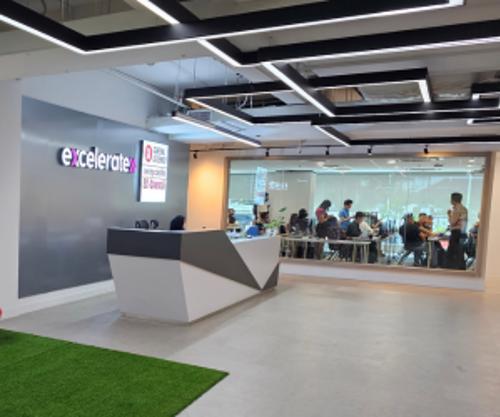


Staying Ahead of the Curve: Why the Telecoms Industry Needs to Invest in Future-Ready Talent
Excelerate
Published on May 03, 2023
Share this Article
The telecommunications industry is experiencing a period of rapid transformation driven by emerging technology trends and increasing consumer demand for seamless, high-quality, safe connectivity. The industry is under pressure to accelerate its digital reinvention, shorten time to market, and adapt security practices. Decision-making is also becoming more data-driven, while silos are being broken down to enable greater collaboration across the organisation.
One of the top emerging trends driving this transformation is 5G, which is being hailed as a game-changer for the industry. But it's not the only trend at the top of the agenda. The growing importance of edge computing, AI and big data, IoT, cloud computing, software-defined networking, and Open Radio Access Networks (RAN) all mean new offerings for telecom. For example, innovation in IoT is introducing smart grid automation, smart cities, smart home devices, monitoring systems, and autonomous vehicles to consumers' lives.
The telecoms industry is facing a pivotal moment where it needs to do more than simply adapt to new technologies. It must also integrate technological solutions across the business, improve and update existing processes, and act now to build a future-ready workforce to navigate changes and stay competitive. And there is a short window of opportunity to act, as familiar roles undergo a transformation due to the ever-evolving skill mix in automation, emerging technologies, and new business models.
A recent study analysed the penetration of rising skills over the past decade and found a significant shift in the skills necessary for a variety of roles. The study showed that the most common telecom roles and skills are not yet equipped with future skills. The changing role of a network engineer is a prime example. While the industry is better positioned to build out capabilities for its cloud and edge computing, big data, and AI, the analysis identified the industry's lowest talent readiness is in areas such as 5G and Open RAN.
Image Source: Eightfold Intelligence Platform
Prioritising building an equipped workforce with the skills and resources requires a concerted effort to integrate technology and processes, foster a culture of trust and collaboration, and develop talent with the skills needed to tackle emerging challenges and seize opportunities.
Technology and processes
The first step in building a future-ready workforce is to integrate technology and processes that enable employees to work more efficiently and effectively. For instance, automation can be used to streamline processes, reduce costs, and enhance customer experiences. By automating routine tasks, employees can focus on higher-value activities like customer service, product development, and innovation.
Another critical component of building a future-ready workforce is modernising existing processes. For example, the telecoms industry has traditionally been known for its hierarchical, top-down management style. However, this approach is increasingly becoming outdated in today's fast-paced, customer-centric environment. Instead, the industry needs to embrace agile methodologies, which prioritize collaboration, flexibility, and responsiveness.
Prioritising customer centricity is also crucial in building a future-ready organisation. Today's consumers expect a seamless, omnichannel experience, and telecoms companies need to deliver. By prioritizing customer needs and preferences, telecoms companies can build loyalty and trust, which is essential for long-term success.
Culture
Creating a culture of trust, collaboration, and ownership is critical, especially for the newer generation. Employees need to feel valued, empowered, and invested in the success of the organisation. To achieve this, telecom companies need to integrate growth mindset principles into coaching practices and engage in frequent, two-way communication.
A growth mindset is a belief that skills and abilities can be developed through dedication and hard work. By integrating growth mindset principles into coaching practices, telecom companies can encourage employees to take risks, learn from failures, and constantly improve. This approach fosters a culture of innovation and continuous improvement, which is essential for staying competitive in the digital age.
Engaging in frequent, two-way communication is also crucial in building a culture of trust, collaboration, and ownership. Employees need to feel heard and valued and understand how their work contributes to the organisation's overall goals. By engaging in regular, open communication, telecoms companies can foster a sense of community and teamwork, which is critical for building a high-performance culture.
Talent
Building an adaptable human capital with skills that empower talent to tackle emerging challenges is the third critical component in the telecoms industry. Without proper workforce planning, most transformations will fail. To build a tech-enabled team, telecoms companies need to identify the skills and capabilities they will need in the future, and then potential employees to build those skills.
One critical skill that is becoming increasingly important in the telecoms industry is data analytics. As the industry becomes more data-driven, employees who can analyze and interpret data will be in high demand. Additionally, employees who have experience in emerging technologies such as AI, machine learning, and blockchain will be highly sought after.
Telecom companies can consider adopting a "hiring for potential" approach, which can enable them to tap into a significantly larger pool of skilled talent. For instance, when hiring for a future skill like Python, companies can look for candidates with adjacent skills such as C++, algorithms, Java, R, and data structures, and use AI tools to identify those who can quickly learn Python. By expanding the talent pool in this way, companies can potentially double the number of suitable candidates, paving the way for a future-ready workforce with the skills to tackle emerging challenges. Along with upskilling, reskilling, and role calibration, potential-based hiring can prove to be a game-changer for the telecom industry.
The telecoms industry has a long history of innovation and adaptability. By embracing these three critical areas and building a future-ready workforce, the industry can continue to lead the way in technological innovation, customer satisfaction, and profitability This three-fold solution can help the telecoms industry overcome its talent challenges and build a future-ready workforce capable of navigating emerging challenges and seizing opportunities. The industry can ensure its continued success and leadership in the digital age by prioritising talent development.
View Related Courses
This Article Is Tagged Under
Excelerate
Published on May 03, 2023
Share this Article
Related Articles. Here’s what we’ve been up to recently.
Generative AI: The Game-Changer for Malaysian E-commerce Success
Discover how Generative AI is transforming Malaysian e-commerce. From improving customer experiences to optimising operations, the e-commerce industry has adopted AI to improve productivity and efficiency. Learn about the benefits and real-world applications driving e-commerce success and positioning Malaysian businesses at the forefront of the digital marketplace. Explore the transformative power of Generative AI and its impact on the future of e-commerce in Malaysia.
Jul 26, 2024
How AI is Revolutionising the Financial Services Industry in Malaysia
In this insightful blog post, we delve into the transformative impact of artificial intelligence (AI) on the financial services sector in Malaysia. With 92% of Fortune 500 companies integrating OpenAI into their operations, the financial services industry is no exception. Discover how AI is enhancing efficiency, reducing human error, and bolstering data security. We explore real-world examples of AI applications, from Maybank's AI-driven mobile banking app to CIMB Malaysia's digitalisation efforts.
Jul 17, 2024
Why Should You Care About The Cyber Security Bill 2024
Explore the implications of Malaysia's newly passed Cyber Security Bill 2024, including its impact on critical infrastructure sectors and recent examples of cyberattacks.
Apr 30, 2024




